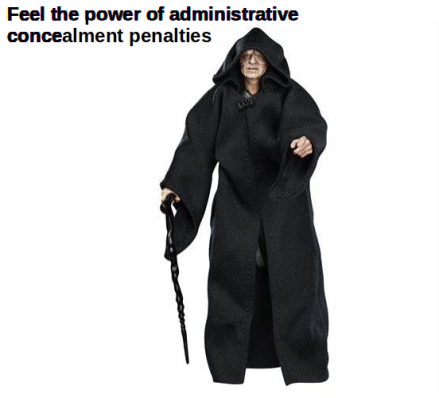There is no doubt any longer that the 40% administrative concealment penalty that the Department charges for unemployment fraud is highly profitable to the Department.
Note: The 40% administrative penalty is actually two separate penalties: a 15% penalty that goes back into the unemployment trust fund and a 25% penalty that goes into a separate program integrity fund.
The program integrity fund has mushroomed in size with the Covid-19 pandemic, as all of those unemployment benefits that were paid out have become an effective mechanism for charging unemployment fraud for unintentional claim-filing mistakes and thereby tacking on additional administrative concealment penalties. From its creation in December 2015, the program integrity fund has risen to over $36 million by March of this year.

The “dedication” of the Department to charging these administrative concealment penalties became obvious from testimony during various hearings in 2022 and early 2023, when Department program integrity staffers revealed that the Department applied the 40% administrative concealment penalties as early as December 2020 to Pandemic Unemployment Assistance (“PUA”) benefits.
At that time, the U.S. Dep’t of Labor had explicitly directed that PUA benefits were NOT subject to administrative concealment penalties, because the U.S. Dep’t of Labor understood at that time that PUA benefits were like Disaster Unemployment Assistance (“DUA”) benefits. See UIPL No. 16-20 Change 2 (21 July 2020) at I-9 (states may not impose a 15% fraud penalty or their own disqualification period because provisions set forth in 20 CFR § 625.14 for DUA benefits govern and did not allow for such additional fraud penalties).
Note: DUA benefits are FEMA-funded and so not an unemployment benefit at all, an important point that will be revisited below.
Another note: In UIPL No. 16-20 Change 4 (8 Jan. 2021) at I-24 to I-25, the U.S. Dep’t of Labor reversed course by concluding that Section 251 of the Trade Adjustment Assistance Extension Act of 2011 (TAAEA), Pub. L. 112-40 (2011) applied to PUA benefits, as PUA benefits qualify as an “unemployment compensation program of the United States” for which a minimum 15% administrative concealment penalty must be charged. In UIPL No. 20-21 (5 May 2021) at 4-5, the U.S. Dep’t of Labor expanded application of administrative concealment penalties to include PUC, MEUC, and PEUC benefits as well as PUA benefits.
So, the Department had decided to charge administrative concealment penalties for PUA benefits WHEN the U.S. Dep’t of Labor had explicitly directed states to NOT charge administrative concealment penalties for PUA benefits and BEFORE the U.S. Dep’t of Labor had reversed course and determined that PUA benefits should be subject to administrative concealment penalties.
In light of the Department’s “dedication” to charging administrative concealment penalties, the Department also began charging its administrative concealment penalties to Lost Wages Assistance that claimants received (according to Department program integrity staffers, the Department made the decision to charge administrative concealment penalties for Lost Wages Assistance in August 2020, more than a month before any Lost Wages Assistance was even paid out to claimants in Wisconsin).
Furthermore, the Department charged these administrative concealment penalties in many cases without any notice, as the first UCB-27 forms in 2021 that set forth over-payments for Lost Wages Assistance failed to disclose the administrative concealment penalties the Department was charging.
Note: Compare later UCB-27 over-payment notices for Lost Wages Assistance that included the administrative concealment penalties.
And, there certainly was no way to appeal these alleged over-payments, as the UCB-27 forms were not themselves appealable, only notices that could be “objected” to.
The problem here is that Lost Wages Assistance, like Disaster Unemployment Assistance, was awarded from Robert T. Stafford Disaster Relief, see generally 42 USC §§ 5121–5207, and Memorandum on Authorizing the Other Needs Assistance Program for Major Disaster Declarations Related to Coronavirus Disease 2019 (Aug. 8, 2020). As with DUA benefits, Lost Wages Assistance was funded as emergency disaster relief and was never a federally-funded unemployment benefit. So, there was never any legal basis for charging administrative concealment penalties for Lost Wages Assistance.
As already observed, however, the Department was and is “dedicated” to charging administrative concealment penalties. As a result, only a few people who had representation have managed to challenge these administrative concealment penalties for Lost Wages Assistance.
Those who managed to get this issue to the Labor and Industry Review Commission finally saw a different result, as the Commission concluded that there was no legal basis whatsoever for charging administrative concealment penalties for Lost Wages Assistance.
On September 27, 2022, an appeal tribunal decision was issued finding that the claimant intentionally concealed work and wages from the department while working as a self-employed real estate agent. The decision resulted in a $1,200 overpayment of LWA benefits. [The appeal tribunal had also concluded that 40% administrative concealment penalties applied to Lost Wages Assistance because concealment penalties always apply when there is unemployment fraud.]
The issue presented in this case is whether the department may assess a 40% penalty on the LWA overpayment because of the concealment of the hours worked and income received by the claimant from his self-employment.
The commission finds that the Department does not have the legal authority to charge a penalty on fraudulently obtained LWA benefits. The LWA program is not an unemployment benefit program, and the associated benefits are not unemployment benefits.
Note: Ex. 7 at U78; Hearing Tr. at 39 (Department witness testified that “LWA is not an unemployment benefit.”)[.] The LWA program was created by a Presidential Memorandum on August 8, 2020, under the Robert T. Stafford Disaster Relief and Emergency Assistance Act[,] 42 U.S.C. § 5174 (the “Stafford Act”).
As such, the legal authority that requires a penalty to be charged on fraudulently obtained regular unemployment benefits and the federally provided pandemic unemployment benefits does not extend to the LWA program and benefits.
Note: The Department of Labor (“DOL”) initially advised states that a fraud penalty could not be charged on Pandemic Unemployment Assistance (“PUA”) benefits that were obtained fraudulently. UIPL 16-20, Change 2, Attachment I, I-9, issued July 21, 2020. However, the DOL subsequently changed its stance on whether a penalty could be charged on PUA benefits that were obtained fraudulently. UIPL 16-20, Change 4, issued January 8, 2021. The DOL provided further guidance that informed states that the fraud penalty must be charged to all CARES Act unemployment benefits obtained fraudulently. This included PUA, Federal Pandemic Unemployment Compensation (“FPUC”), Mixed Earners Unemployment Compensation (“MEUC”), and Pandemic Emergency Unemployment Compensation (“PEUC”) benefits. UIPL 20-21, p 4-5[,] issued May 5, 2021. As justification for this change, the DOL cited Section 251(a) of the Trade Adjustment Assistance Extension Act of 2011 (“TAAEA”) (Pub. L. 112-40), which created section 303(a)(11) of the Social Security Act (“SSA”) (42 U.S.C. § 503(a)(11)). Section 251(a) of the TAAEA applies to unemployment benefit programs. 42 U.S.C. § 503(a)(11) states, “At the time the State agency determines an erroneous payment from its unemployment fund was made to an individual due to fraud committed by such individual, the assessment of a penalty on the individual in an amount of not less than 15 percent of the amount of the erroneous payment.”
The claimant was paid LWA for weeks 31, 33, 34, and 36 of 2020 in the amount of $1,200.00 [$300 each week], for which the claimant was not eligible and to which the claimant was not entitled, and that the payment of such benefits was due to. Fault on the part of the claimant and/or repayment would not be contrary to equity and good conscience, and that recovery of the benefits paid shall not be waived, within the meaning of Section 262 of the Continued Assistance for Unemployed Workers Act of 2020.
The department may not assess an administrative penalty equal to 40% of the LWA overpayment.
The Department’s “dedication” to administrative concealment penalties would not be denied, however. And so, the Department appealed the Commission decision to circuit court. But, it turned out that the circuit court was not as dedicated to administrative concealment penalties as the Department. The court initially observed:
This case involves the legality of a $480 penalty the Department of Workforce Development (“Department”) assessed against [the claimant] for his inappropriate receipt of $1200 in disaster relief funds stemming from his concealment of real estate commissions earned during four weeks in 2020. It is a fair assumption that, even with rigid adherence to electronic document protocols to prevent waste, the litigants have incurred more than $480 in paper costs addressing this penalty.
The amount of the penalty, however, is not the issue. The issue is the Department’s authority to assess it, and in order to resolve that issue, the Court must harken back to the strange and surreal period known as the COVID-19 pandemic.
* * *The Department essentially makes two arguments supporting its authority to assess a penalty on overpaid LWA payments. First, it contends that the provisions of the CARES Act specifically authorize the Department to assess a penalty, and those provisions can and should apply to the LWA, as well. Second, the Department argues that, because [the claimant’s] LWA benefits were paid from the Wisconsin Unemployment Trust Fund, the Department is authorized to charge a 40% penalty—and in fact the Department is statutorily required to impose that penalty—under Wis. Stat. § 108.04(11)(bh).
The court rejects both claims. First:
Unlike the CARES Act programs, however, LWA is not an unemployment program. The source of the program, the guidance associated with it, and the testimony of the Department’s own witness before the appeal tribunal, establish this. None of the authorities cited by the Department specifically authorizes the Department to charge a penalty on LWA overpayments, nor does the State Plan agreement with FEMA authorize imposition of a penalty.
Second, as to payment of Lost Wages Assistance coming from the unemployment trust fund through a decision by the Department to pay Lost Wages Assistance from the trust fund rather than following federal guidance:
LWA, however, is not an unemployment insurance program, but a major disaster assistance program, and thus [California Dep’t of Human Resources Development v. Java, 402 U.S. 121 (1991)] provides no support for the Department’s actions. Moreover, the USDOL was clear in its guidance that states could not use funds in their unemployment account in the Unemployment Trust Fund to process funding for LWA payments. (Doc. 38 at 96 of 134 (UIPL 27-20, Change 1)). Simply because the Department ignored that guidance and inappropriately paid [the claimant’s] LWA benefits from the Unemployment Trust Fund does not then bootstrap the Department’s authority to treat the payment like an unemployment payment and assess the penalty otherwise required by § 108.04(11)(bh). Organizations, particularly publicly traded corporations, can get into big trouble for pulling a stunt like the Department pulled in funding the LWA payments from an unauthorized account. In this Court’s view, state agencies should be held to a higher standard, not a more lenient one, when accounting for and disbursing public funds.
The tragedy here is that the Department’s illegal “dedication” to administrative concealment penalties has already won out. As the above-chart demonstrates, the Department has likely collected hundreds of thousands of dollars in administrative concealment penalties tied to Lost Wages Assistance that it will NOT be refunding to anyone, despite this court decision. Indeed, many do not even know about these illegal collections by the Department because they never received notice in the first place.























